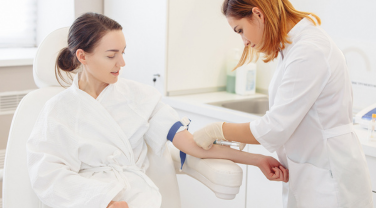
Testing for STDs should always be an important part of your health routine especially if you are sexually active. Previously the tests used procedures that people found embarrassing or uncomfortable. However, more simple, less invasive blood and/or urine tests are now available and a good number of STDs are identified including Gonorrhea and Chlamydia.
What is an STD?
There is a difference between an STI and an STD: An STI is the classification used for a bacterial or viral infection. When treatment is followed it usually resolves.
If an STI is left untreated it may develop into a more serious STD. Testing is important to get it under control and the correct treatment and to also to stop it from spreading. Some STIs/STDs are asymptomatic. An STD has usually has more noticeable signs and symptoms.
What STIs Can Be Detected by Blood Tests?
Genital Herpes
There are several STI blood tests available to check for herpes. Blood can identify HSV-1 and HSV-2, but not for genital or oral herpes which is usually recognised by genital sores but this is not always the case.
Herpes testing kits vary but a blood test at our clinic will confirm your diagnosis.
HIV
A blood sample is used to identify Human Immunodeficiency Virus (HIV), which is a lifelong disease once you become infected.
Several testing procedures are used to check for the p24 antigen and antibodies produced by the immune system indicating a HIV infection. Further testing is required to confirm the diagnosis before classifying someone as HIV-positive.
HIV tests now are convenient, easier, and more discreet than they used to be.
The following blood tests are used to identify HIV.
HIV DUO Test: The test known as the DUO, is a combination of the p24 antigen and HIV1 or HIV2 antibodies. This is the current HIV testing standard in the UK and the prescribed test of choice. It is accurate after 28 days of possible exposure. A 5th-generation HIV test, in contrast to the 4th-generation test, indicates whether the reactive response was caused by the p24 antigen, or the HIV1/HIV2 antibodies.
RNA PCR Test: This is the oldest test which can identify a HIV infection: 10 days after exposure. HIV 1 can be found in the body using the PCR testing method. It is advised that a DUO test be conducted 28 days after this one to confirm HIV for treatment options which will be discussed with the doctor prior to starting medications.
Instant HIV Test: Rapid HIV tests can identify HIV 1, 2, and the p24 antigen, similar to the DUO test but 26 days following a concerning incident. This test is carried out as you wait for your appointment in less than 20 minutes and is used instead of sending a blood sample to a laboratory. However further testing is still required later to confirm diagnosis.
Syphilis
Syphilis is a bacterial infection that can seriously harm the body over time. If asymptomatic, a blood test and/or a swab test from any sores will confirm diagnosis. Antibodies are found, with a blood test, nine days after exposure.
Hepatitis B
A blood test called a Hepatitis Panel is used to identify people who have been exposed to the Hepatitis A, B, or C virus. The panel covers all Hepatitis infections. Hepatitis B is essentially the predominant viral infection, which is spread by bodily fluid i.e. semen, blood, and vaginal fluid. A blood sample is taken to look for the presence of antigens and antibodies linked to the Hepatitis virus which is known as a Hepatitis screen.
Blood sample collections, laboratory analysis, findings and documentation preparation form a medical and a clinical professional(s) practice.
Several blood tests are available to identify Hepatitis. These tests can determine whether you currently have the virus or have had the infection in the past. Book an STI blood test at our clinic today!
STIs Detected by Swab Tests Only
Testing swabs around the vagina or penis with sores is an easy way to diagnose some STIs. Sometimes, a genetic test on the swab's cells may be used to confirm the STI's presence.
The following STIs may be identified through swab sample testing:
- Chlamydia
- Gonorrhea
A pelvic exam can be used to test for the Human Papillomavirus (HPV).
It requires a sample of cells from the cervix's opening. For those who have experienced sexual abuse in the past or who are embarrassed or uncomfortable. Self-care swabs can be a good alternative but need to be accurately collected for a definitive diagnosis.
Speak with your healthcare physician if you have concerns about a swab test and believe you require one. In some circumstances, you might be allowed to take the swab yourself.
Conclusion
Being screened is no reason to be embarrassed or feel guilty. You can visit a private doctor in London to talk about any infections you may have had. He/she is experienced and have seen and done it all before. Your doctor will go over the specific laboratory testing requirements for STDs with you.
Based on your results, any treatments required for persistent infections and long term issues will be discussed and addressed.
It is normal for you to experience a wave of emotions if your test results are positive. Treatments for some STDs efficiently reduce symptoms and cure them, so don't get overwhelmed. Be honest and frank and the doctor(s) will professionally and discreetly be able to help you.



-min.jpg)

